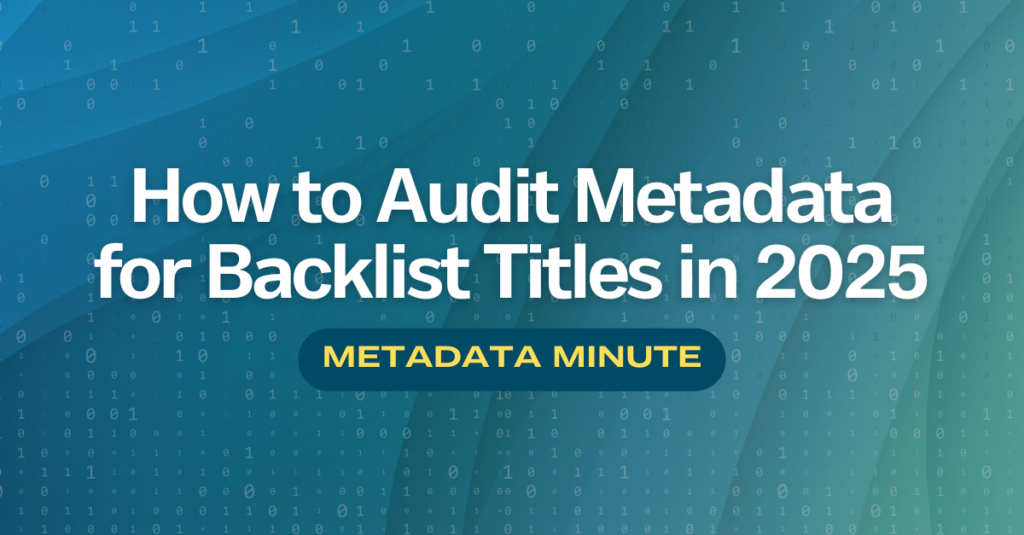
Metadata Minute (Issue #21): How to Audit Metadata for Backlist Titles in 2025
In 2025, metadata isn’t just administrative, it’s strategic. Good metadata is the key to driving discoverability, retailer rankings, library interest, and backlist sales. Yet many publishers still leave older titles untouched, assuming that what worked at launch still works now.
According to Circana BookScan, backlist titles make up 70% of total book sales every year. Therefore, conducting regular metadata audits can protect future sales and can unlock major gains in visibility and revenue.
This auditing process is made much easier with the support of our retail auditing platform, Eloquence on Alert (EOA). However, whether you are using EOA or not, here’s how to get started with a backlist metadata audit.
Step 1: Choose Which Titles to Audit
Start small. Instead of tackling your entire blacklist, focus on a targeted group—like your top 100 sellers, a single genre or imprint, books tied to promotions and media, or titles with known outdated or missing metadata. Some publishers schedule audits each month for a specific set of backlist titles.
Eloquence on Alert helps streamline this process by identifying titles with pricing errors, outdated or inconsistent metadata and highlighting underperformers with strong potential (ask us about Impact Scores).
Step 2: Centralize Metadata and Identify Gaps
Once you’ve selected your titles, gather all related metadata into one centralized location—like a shared spreadsheet or database—so you can easily compare, sort, and identify inconsistencies.
Essential fields include:
- Title, subtitle, series
- Author & contributor biographies
- Subject codes and keywords
- Prices
- Description, reviews, awards
- Cover images
Did you know? Eloquence on Alert tracks this data daily! Our advanced title monitoring system flags missing or distorted cover images, price shifts, and metadata inconsistencies across major retailers. We make it easy to identify gaps and ensure updates are reflected consistently.
Step 3: Evaluate for Quality and Searchability
It’s not enough for metadata to be complete—it must be effective. Use a checklist or bring your team together to review what’s working and what isn’t.
Evaluate:
- Are BISAC codes accurate and specific to this book’s topic?
- Could you improve the cover image, or add additional assets?
- Do descriptions include compelling, up-to-date language?
- Are keywords aligned with how readers are searching today?
- Is anything outdated, missing, or repetitive?
AI-powered tools can help speed up this step by scanning for outdated phrasing, redundant metadata, and poor keyword targeting.
Step 4: Make Strategic Updates
With issues identified and goals set, it’s time to take action.
- Update outdated descriptions with search-optimized copy
- Replace low-resolution or outdated cover images, and add additional images and A+ content
- Refresh BISAC codes
- Add missing metadata, such as reviews and endorsements
- Update author and contributor biographies
Eloquence on Alert watches to ensure that your updates have reached the retail platforms and sends alerts if any revert or go missing. So your hard work sticks!
Step 5: Track Results and Measure Impact
Once updates are live, begin tracking performance changes. Here are some key metrics to monitor.
- Sales before vs. after the audit
- Retailer ranking and category placement
- Conversion and click-through rates
- Library hold and circulation data
- Metadata accuracy and compliance
Eloquence on Alert can automate much of this, sending alerts when issues arise and tracking rank changes to help you measure ROI and fine-tune future audits.
Step 6: Build a Repeatable Workflow
This is quite possibly the most important step. The real value of a metadata audit comes from making it a habit. Metadata maintenance should be part of your ongoing publishing workflow—not just a quick cleanup project.
To keep the momentum:
- Schedule recurring audits (quarterly, seasonally, by imprint, etc)
- Assign responsibilities across teams (editorial, marketing, production)
- Use Eloquence on Alert for automated sales rank tracking and error detection. Adding Tags is a great way to monitor specific lists of titles.
- Create documentation to ensure consistency and visibility
- Keep an ongoing list of your titles with the most recent date they were audited
- Create marketing campaigns in Title Management to organize and schedule your audits
Think of it like brushing your teeth—regular care prevents bigger problems down the line. With a repeatable workflow in place, you’ll keep your backlist polished, discoverable, and performing at its best.
Metadata isn’t a one-time “set it and forget it” task—it’s an ongoing opportunity. With a repeatable workflow and tools like Eloquence on Alert, your team can catch issues early, track improvements, and keep your backlist performing its best.
Let your metadata work as hard as your books do! Get started with Eloquence on Alert today.
What if you don’t have time to do this work yourself?
Let our team help! Firebrand’s Flywheelservice makes the right metadata changes at the right time to increase your blacklist sales. Publishers with Vendor Central can sign up for this powerful service.
Download our Case Study to learn more or reach out to our Director of Sales & Eduction, Joshua Tallent, at joshua@firebrandtech.com.
For more publishing insights and book metadata tips, stay tuned to Metadata Minute—your monthly guide to smarter, sharper metadata.
Subscribe today to receive the “Metadata Minute” newsletter on the last Monday of each month. If you missed it, they will also be included in our monthly Firebrand Newsletter, sent straight to your inbox.
